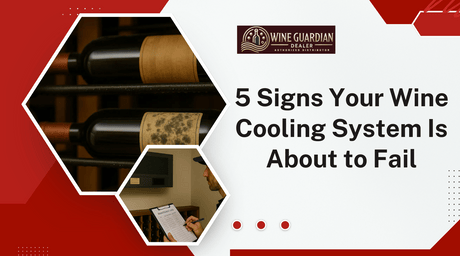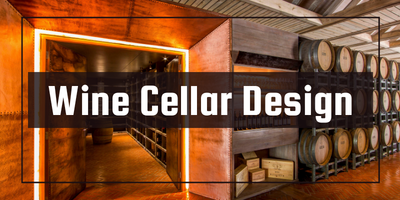
5 Signs Your Wine Cooling System Is About to Fail
Don’t wait for a costly surprise. Wine Guardian Dealer breaks down the top 5 signs your wine cooling system may be failing — and how to fix it before damage...
Jim Hopper
In Stock & Ready to Ship – Order Your Wine Cooling System Today!
Free Wine Cellar Expert Consultation | 📞 Call 1-800-260-1712
Start with a free expert consult—cooling system sizing, racking options, and no upsells.

Build your dream wine cellar—without costly mistakes or guesswork.
By Jim Hopper, Wine Cooling Expert
When building or upgrading a wine cellar, choosing the right wine cellar flooring is essential for maintaining optimal humidity control, insulation, and aesthetics. Flooring materials impact temperature regulation and prevent moisture damage, ensuring your wine collection remains in perfect condition. Selecting the wrong floor can waste your insulation efforts, making it crucial to choose wine cellar flooring materials that align with your cellar’s needs. A vapor barrier is essential when installing flooring over concrete to prevent moisture issues.
In this guide — grounded in our full Wine Cellar Design and Installation: Build a Beautiful, Functional Wine Room That Lasts — we explore the best flooring for wine cellars, covering materials, pros and cons, installation tips, and 2025 design trends to help you make an informed decision.

Before selecting wine cellar flooring materials, consider these critical factors:
Moisture Resistance & Humidity Control: Prevents mold, mildew, and water damage, ensuring long-term preservation of fine wine. A vapor barrier is essential to protect wine cellars from moisture buildup and warping of flooring materials. Humidity levels of 50-70% are ideal for wine cellars, impacting the choice of flooring materials. Higher humidity levels in wine cellars can cause solid wood floors to swell and warp.
Insulation & Temperature Regulation: Helps maintain stable wine storage conditions by reducing humidity levels fluctuations.
Durability & Maintenance: Choose a durable material that withstands long-term use with minimal upkeep.
Aesthetic Appeal & Design: Select a flooring option that complements your wine room flooring theme.
For expert insights, consult Wine Spectator and professional cellar designers to determine the ideal flooring solution.
Here are the top-rated wine cellar flooring choices for 2025:
✔️ Extremely durable, moisture-resistant, and visually stunning.
❌ Expensive and often requires professional installation
Stone flooring fits both contemporary and traditional wine cellar designs, offering a suitable option to match any aesthetic. Stone tile is a beautiful and durable flooring option that does not stain easily, making it a practical choice for wine cellars. Concrete flooring is durable and commonly used in wine cellars. Custom wine cellar flooring can also be made from reclaimed wine barrels, adding a unique and sustainable touch to your design.
✔️ Waterproof flooring for wine cellars, easy to clean, and available in various styles. ❌ Can be cold underfoot, requiring insulation or underlayment. Consumers can buy porcelain tiles in various shapes and sizes for a personalized design.
✔️ Affordable, customizable with stains and finishes.
❌ Porous material that requires sealing to prevent moisture absorption.
✔️ Eco-friendly cork floors provide excellent insulation and soundproofing. Cork contains air filled cells, which make it porous and cushiony, providing comfort underfoot, especially beneficial for individuals with joint pain.
❌ Susceptible to water damage if not properly sealed.
✔️ Classic, elegant aesthetic for wine cellars
❌ Requires sealing to prevent warping due to high humidity
✔️ Cost-effective, water-resistant, and mimics high-end materials
❌ Lacks the premium feel of natural materials.

Reclaimed wine barrels are a unique and charming option for wine cellar flooring. The removed metal bands leave unique imperfections that add character to the aesthetics of the room. Each piece of vertical wood carries a distinct wine stain, giving your flooring a one-of-a-kind appearance that tells a story. This type of flooring is perfect for those who want to add a touch of history and character to their wine cellar. The rich hues and textures of reclaimed barrel wood can be beautifully paired with modern furniture and sleek wine racks, creating a stylish and eclectic look that blends the old with the new. Not only does this flooring option offer aesthetic appeal, but it also contributes to sustainability by repurposing materials that would otherwise go to waste. Wood floors are popular due to their natural beauty and warmth in wine cellars.
Mosaic tile flooring is a beautiful and artistic option for wine cellar flooring. Made with a combination of porcelain, stone, and other materials, mosaic tiles can create a one-of-a-kind look that adds a touch of elegance to your space. This flooring choice is perfect for those who want to make a bold statement with their wine cellar design. With many materials to choose from, you can craft intricate patterns and designs that fit your personal style and the overall theme of your wine room. However, mosaic tiles should be used sparingly in wine cellars due to their weight, which may require additional structural support.
|
Flooring Type |
Durability |
Maintenance |
Cost |
Aesthetic Appeal |
|---|---|---|---|---|
|
Stone |
High |
Low |
$$$ |
Elegant |
|
Tile |
High |
Low |
$$ |
Versatile |
|
Concrete |
Medium |
Medium |
$ |
Industrial |
|
Cork |
Medium |
Medium |
$$ |
Warm & Cozy |
|
Hardwood |
Medium |
High |
$$$ |
Classic |
|
Vinyl |
Medium |
Low |
$ |
Budget-friendly |
Subfloor Preparation: Ensure a level, moisture-resistant subfloor to prevent damage. The flooring in a wine cellar should not trap moisture, as this can lead to mold.
Sealing & Waterproofing: Apply proper sealants to enhance durability and moisture resistance
DIY vs. Professional Installation: Vinyl and cork can be DIY wine cellar** flooring**, while stone and hardwood require professionals for long-term stability.

When it comes to budgeting for wine cellar flooring, it's essential to consider the importance of durability and sustainability. Investing in high-quality, sustainable flooring materials may seem expensive upfront, but it can save you money in the long run by reducing the need for frequent replacements.
Cork flooring, for example, is a sustainable and eco-friendly option that is also soft and stylish. Its natural cushioning provides a comfortable feel underfoot, making it a practical choice for wine cellars. Concrete flooring is another option that is built to last and can withstand heavy foot traffic and the weight of wine racks and furniture.
Durability is a key consideration for wine cellar flooring due to spills and foot traffic. When budgeting for wine cellar flooring, be sure to consider the cost of materials, installation, and maintenance to ensure that you get the best value for your money. By choosing durable and sustainable options, you can create a wine cellar that not only looks great but also stands the test of time.

The wine cellar flooring is just one piece of the puzzle when designing the perfect wine cellar. The weight of numerous wine bottles can significantly impact the selection of flooring materials. To ensure your wine collection is stored in optimal conditions, you also need a high-performance wine room cooling and flooring system. At Wine Guardian Dealer, we specialize in providing industry-leading Wine Guardian cooling units, designed to maintain precise humidity-resistant flooring for wine cellars.
Enhance your wine storage experience with the best cooling technology available. Explore our range of Wine Guardian cooling systems today and ensure your wine collection ages perfectly in a well-maintained environment
Looking for personalized advice on wine room flooring ideas and climate control solutions? Contact our experts today for tailored recommendations from Wine Guardian Dealer!
Sealed stone, ceramic tile, brick, concrete, and engineered hardwood — all moisture-resistant and stable.
Yes — sealing prevents moisture absorption, staining, and damage to porous surfaces.
Use engineered hardwood only. Solid hardwood and softwoods can warp from humidity.
Not required, but helpful for cleaning and managing moisture with porous flooring like brick or concrete.
🛒Shop our most-loved Wine Guardian cooling systems today.
🛠️Protect your wine with the most trusted systems on the market.
❤️Tested, reviewed, and loved by serious collectors like you.